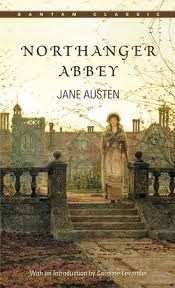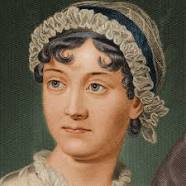Northanger Abbey Page #11
Northanger Abbey was the first of Jane Austen's novels to be completed for publication, in 1803. However, it was not published until after her death in 1817, along with another novel of hers, Persuasion.
From this state of humiliation, she was roused, at the end of ten minutes, to a pleasanter feeling, by seeing, not Mr. Thorpe, but Mr. Tilney, within three yards of the place where they sat; he seemed to be moving that way, but he did not see her, and therefore the smile and the blush, which his sudden reappearance raised in Catherine, passed away without sullying her heroic importance. He looked as handsome and as lively as ever, and was talking with interest to a fashionable and pleasing-looking young woman, who leant on his arm, and whom Catherine immediately guessed to be his sister; thus unthinkingly throwing away a fair opportunity of considering him lost to her forever, by being married already. But guided only by what was simple and probable, it had never entered her head that Mr. Tilney could be married; he had not behaved, he had not talked, like the married men to whom she had been used; he had never mentioned a wife, and he had acknowledged a sister. From these circumstances sprang the instant conclusion of his sister's now being by his side; and therefore, instead of turning of a deathlike paleness and falling in a fit on Mrs. Allen's bosom, Catherine sat erect, in the perfect use of her senses, and with cheeks only a little redder than usual. Mr. Tilney and his companion, who continued, though slowly, to approach, were immediately preceded by a lady, an acquaintance of Mrs. Thorpe; and this lady stopping to speak to her, they, as belonging to her, stopped likewise, and Catherine, catching Mr. Tilney's eye, instantly received from him the smiling tribute of recognition. She returned it with pleasure, and then advancing still nearer, he spoke both to her and Mrs. Allen, by whom he was very civilly acknowledged. “I am very happy to see you again, sir, indeed; I was afraid you had left Bath.” He thanked her for her fears, and said that he had quitted it for a week, on the very morning after his having had the pleasure of seeing her. “Well, sir, and I dare say you are not sorry to be back again, for it is just the place for young people--and indeed for everybody else too. I tell Mr. Allen, when he talks of being sick of it, that I am sure he should not complain, for it is so very agreeable a place, that it is much better to be here than at home at this dull time of year. I tell him he is quite in luck to be sent here for his health.” “And I hope, madam, that Mr. Allen will be obliged to like the place, from finding it of service to him.” “Thank you, sir. I have no doubt that he will. A neighbour of ours, Dr. Skinner, was here for his health last winter, and came away quite stout.” “That circumstance must give great encouragement.” “Yes, sir--and Dr. Skinner and his family were here three months; so I tell Mr. Allen he must not be in a hurry to get away.” Here they were interrupted by a request from Mrs. Thorpe to Mrs. Allen, that she would move a little to accommodate Mrs. Hughes and Miss Tilney with seats, as they had agreed to join their party. This was accordingly done, Mr. Tilney still continuing standing before them; and after a few minutes' consideration, he asked Catherine to dance with him. This compliment, delightful as it was, produced severe mortification to the lady; and in giving her denial, she expressed her sorrow on the occasion so very much as if she really felt it that had Thorpe, who joined her just afterwards, been half a minute earlier, he might have thought her sufferings rather too acute. The very easy manner in which he then told her that he had kept her waiting did not by any means reconcile her more to her lot; nor did the particulars which he entered into while they were standing up, of the horses and dogs of the friend whom he had just left, and of a proposed exchange of terriers between them, interest her so much as to prevent her looking very often towards that part of the room where she had left Mr. Tilney. Of her dear Isabella, to whom she particularly longed to point out that gentleman, she could see nothing. They were in different sets. She was separated from all her party, and away from all her acquaintance; one mortification succeeded another, and from the whole she deduced this useful lesson, that to go previously engaged to a ball does not necessarily increase either the dignity or enjoyment of a young lady. From such a moralizing strain as this, she was suddenly roused by a touch on the shoulder, and turning round, perceived Mrs. Hughes directly behind her, attended by Miss Tilney and a gentleman. “I beg your pardon, Miss Morland,” said she, “for this liberty--but I cannot anyhow get to Miss Thorpe, and Mrs. Thorpe said she was sure you would not have the least objection to letting in this young lady by you.” Mrs. Hughes could not have applied to any creature in the room more happy to oblige her than Catherine. The young ladies were introduced to each other, Miss Tilney expressing a proper sense of such goodness, Miss Morland with the real delicacy of a generous mind making light of the obligation; and Mrs. Hughes, satisfied with having so respectably settled her young charge, returned to her party. Miss Tilney had a good figure, a pretty face, and a very agreeable countenance; and her air, though it had not all the decided pretension, the resolute stylishness of Miss Thorpe's, had more real elegance. Her manners showed good sense and good breeding; they were neither shy nor affectedly open; and she seemed capable of being young, attractive, and at a ball without wanting to fix the attention of every man near her, and without exaggerated feelings of ecstatic delight or inconceivable vexation on every little trifling occurrence. Catherine, interested at once by her appearance and her relationship to Mr. Tilney, was desirous of being acquainted with her, and readily talked therefore whenever she could think of anything to say, and had courage and leisure for saying it. But the hindrance thrown in the way of a very speedy intimacy, by the frequent want of one or more of these requisites, prevented their doing more than going through the first rudiments of an acquaintance, by informing themselves how well the other liked Bath, how much she admired its buildings and surrounding country, whether she drew, or played, or sang, and whether she was fond of riding on horseback.
Translation
Translate and read this book in other languages:
Select another language:
- - Select -
- 简体中文 (Chinese - Simplified)
- 繁體中文 (Chinese - Traditional)
- Español (Spanish)
- Esperanto (Esperanto)
- 日本語 (Japanese)
- Português (Portuguese)
- Deutsch (German)
- العربية (Arabic)
- Français (French)
- Русский (Russian)
- ಕನ್ನಡ (Kannada)
- 한국어 (Korean)
- עברית (Hebrew)
- Gaeilge (Irish)
- Українська (Ukrainian)
- اردو (Urdu)
- Magyar (Hungarian)
- मानक हिन्दी (Hindi)
- Indonesia (Indonesian)
- Italiano (Italian)
- தமிழ் (Tamil)
- Türkçe (Turkish)
- తెలుగు (Telugu)
- ภาษาไทย (Thai)
- Tiếng Việt (Vietnamese)
- Čeština (Czech)
- Polski (Polish)
- Bahasa Indonesia (Indonesian)
- Românește (Romanian)
- Nederlands (Dutch)
- Ελληνικά (Greek)
- Latinum (Latin)
- Svenska (Swedish)
- Dansk (Danish)
- Suomi (Finnish)
- فارسی (Persian)
- ייִדיש (Yiddish)
- հայերեն (Armenian)
- Norsk (Norwegian)
- English (English)
Citation
Use the citation below to add this book to your bibliography:
Style:MLAChicagoAPA
"Northanger Abbey Books." Literature.com. STANDS4 LLC, 2025. Web. 24 Feb. 2025. <https://www.literature.com/book/northanger_abbey_45>.








Discuss this Northanger Abbey book with the community:
Report Comment
We're doing our best to make sure our content is useful, accurate and safe.
If by any chance you spot an inappropriate comment while navigating through our website please use this form to let us know, and we'll take care of it shortly.
Attachment
You need to be logged in to favorite.
Log In